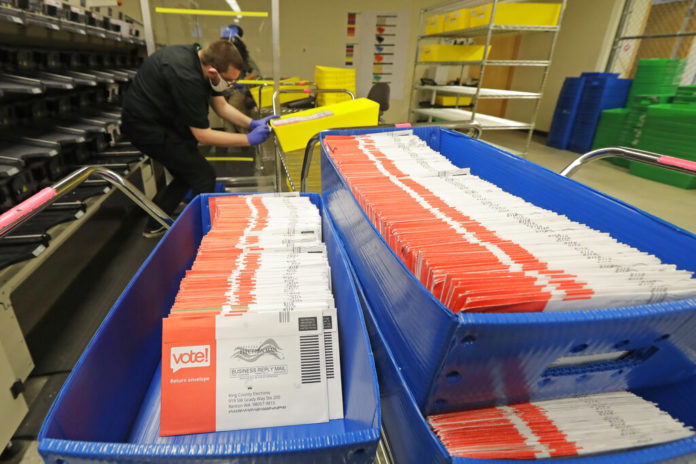
Arizona is the latest Republican-controlled state in the crosshairs of voting rights advocates after Gov. Doug Ducey signed legislation Tuesday allowing potentially tens of thousands of people to be purged from a list of voters who automatically get a mail ballot.
Republicans said the measure will save money and further trust in elections at a time when a substantial share of the GOP base distrusts Donald Trump’s 2020 loss, despite no evidence of problems that could have affected the results.
Critics said the bill will make it harder for people to vote, with an especially strong impact on new or infrequent voters, especially people of color and those living in poverty. Voters on the popular permanent early voting list will be removed if they sit out two consecutive election cycles.
The legislation is likely to be the most substantial election changes made in Arizona this year. It’s not as far-reaching as bills passed or under consideration in Georgia, Florida, Texas, and elsewhere, in part because of the GOP’s slim majorities in both the state House and Senate.
But it still drew fierce opposition from voting rights advocates.
Rosemary Avila, campaign manager for All Voting is Local Arizona, called it “a brazenly harmful, unnecessary attempt to put up barriers between voters and the ballot.”
Arizona has been a pioneer in no-excuse absentee voting and is widely regarded as conducting accurate, accessible elections. It has not joined other western states Colorado, Hawaii, Oregon, Utah, and Washington with all-mail elections, but it comes close: Nearly 90% of all voters in 2020 used a ballot that arrived in the mail. Seventy-five percent of registered voters are on the permanent early voting list.
The state did not change election procedures in response to the pandemic.
Ducey has championed Arizona’s election procedures as a model, including during a meeting with Trump in the Oval Office before the election. He repeated the refrain on Tuesday and downplayed the significance of the legislation he signed, describing it as an incremental change that won’t prevent anyone from voting.
“Others have suggested that ‘now is not the time’ for election reform,” Ducey wrote in a letter explaining his decision. “I could not disagree more. The politics of the moment should not impede good policy, and SB1485 is a measure that ensures our voting lists remain verifiable and accurate, will free up resources for local election officials, and strengthen trust among citizens in our election system.”
Under SB1485, the “permanent early voting list” will be renamed the “active early voting list.” Voters who sit out all elections — municipal, primary and general — for two election cycles will receive a mailer asking if they want to remain on the early voting list. If they respond, nothing will change. If they don’t respond within 90 days, they will be dropped from the list but will remain a registered voter.
They can rejoin the active early voting list at any time, request a mail ballot for a single election, or vote in person. But a ballot won’t automatically arrive in their mailboxes.
Republicans pushing the bill cited two primary rationales: the cost of mailing ballots to people who aren’t using them and the risk of fraud from ballots that leave election offices and never return.
Democrats said the costs are negligible and a worthwhile expenditure to make it as easy as possible for people to vote. They also say there is no evidence of unvoted mail ballots being used fraudulently, and it would be virtually impossible for someone to pull off. The fraudster would have to match the voter’s signature, and election officials would catch on if the owner of the mail ballot requested a replacement or showed up to vote in person.
Democrats said the measure would affect voters in both parties but would have a disproportionate effect on communities of color.
There is ambiguity about when the measure takes effect. It was originally thought to apply to voters who sat out the 2018 and 2020 elections, which would affect about 140,000 people out of 2.7 million on the permanent list, according to an analysis of voter rolls prepared for voting rights advocates.
But legislative lawyers recently wrote that courts would likely say that is a retroactive application of the law. In that case, it would first affect voters in the 2026 election who sit out 2022 and 2024.
Republished with the permission of the Associated Press.













